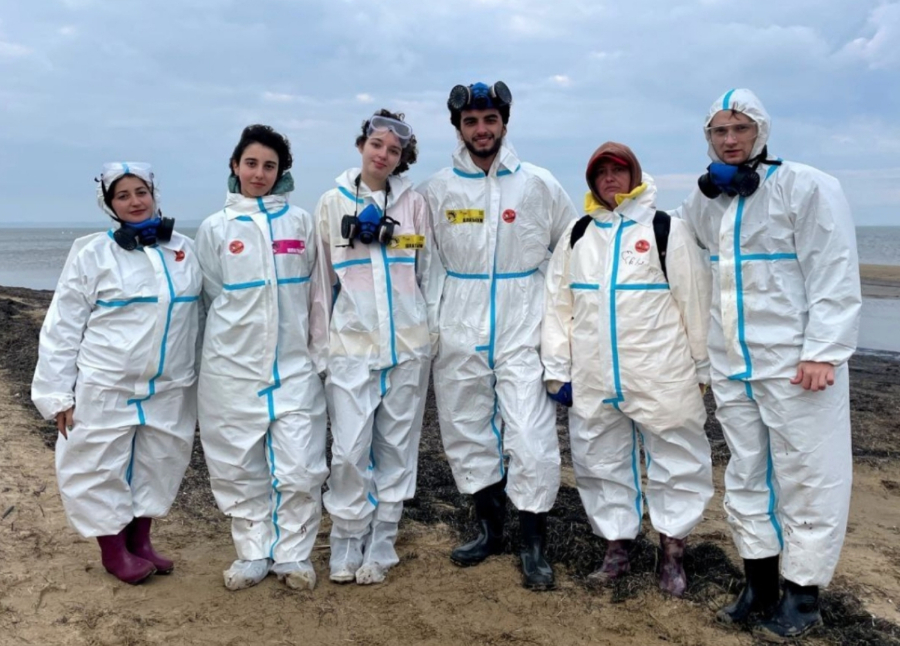Roman Dbar Confirms Kerch Spill No Threat to Abkhazia

Efforts to clean the shores of the Krasnodar Region continue after two Russian oil tankers.
SUKHUM / AQW’A — Two tankers carrying approximately 9,200 tonnes of fuel oil were involved in a collision in the Kerch Strait on 15 December. Roman Dbar, Director of the Institute of Ecology, stated on a local radio broadcast that the oil spill does not pose a direct threat to Abkhazia’s coastline.
According to Dbar, the timing of the incident during winter plays a critical role in mitigating the environmental impact. The lower sea temperatures, which will continue to drop over the next two months, prevent the fuel oil from becoming more fluid. Furthermore, the direction and speed of sea currents make it unlikely that the oil products will reach Abkhazia's shores.
He explained that approximately 350 kilometres separate the site of the spill from the Abkhazian coast. As a result, Dbar assured that Abkhazia’s beaches would remain unaffected, and the incident would not impact the upcoming tourist season.
Impact on Marine Life
Despite the absence of a direct threat to Abkhazia’s coastline, the spill has had a negative effect on marine life. According to Dbar, waterfowl and dolphins, particularly the Azov dolphin (Phocoena phocoena relicta), the smallest of the three dolphin species in the Black Sea, have been the most affected.
Had the collision occurred during warmer months, the consequences would have been far more severe. Dbar noted that many fish and marine animals are currently in a state of dormancy, spawning, or laying eggs, which has helped to reduce the immediate ecological damage.
Dbar predicts that the effects of the spill can be minimised within the next few weeks due to the significant resources being deployed to contain the disaster. "The severity of the incident has escalated from a regional to a federal level, and substantial resources have now been mobilised to address the aftermath," he said.

+ Black Sea Faces Environmental Crisis as Two Russian Tankers Sink
+ Severe Oil Spill in Black Sea After Tanker Disaster Sparks Environmental Crisis
+ Fears Grow Over Long-Term Impact of Black Sea Tanker Disaster
+ 49km of Black Sea Coast Affected by Worsening Oil Spill
Long-Term Environmental Concerns
However, oil products that have sunk to the seabed and mixed with sand will require years to decompose naturally, Dbar warned.
Meanwhile, Olga Pustovarova, Deputy Director of the Centre for Environmental Monitoring at the State Committee for Ecology, reported that no abnormal increases in the concentration of oil products have been detected in the waters off Sukhum.
She noted a slight exceedance of permissible concentrations in fishery water bodies, although this is unrelated to the Kerch Strait incident. Pustovarova added that initial water samples were taken on 9 January, and Abkhazian ecologists will continue to conduct routine testing every two weeks, provided no new fuel oil patches are detected in the sea.

Abkhazian Volunteers Assist in Oil Spill Cleanup in Anapa
Following the oil spill caused by two tanker collisions near the Kerch Strait, which polluted approximately 800 square kilometres of the Black Sea and dozens of kilometres of coastline in Russia’s Krasnodar region and Crimea, a group of volunteers from Abkhazia travelled to Anapa to support cleanup efforts.
Abkhazian volunteer Ruslan Amichba, who organised the group, emphasised the importance of solidarity in tackling such environmental disasters, stating: “Every action matters when it comes to restoring the sea. The Black Sea is our shared heritage, and its protection is a collective responsibility.”
The team of 15 volunteers worked from 10 to 12 January, assisting in cleaning the heavily contaminated Bugaz Spit, where only five of its 12 kilometres have been cleared so far. Volunteers also learned techniques for managing similar disasters, preparing for future challenges in their own region.